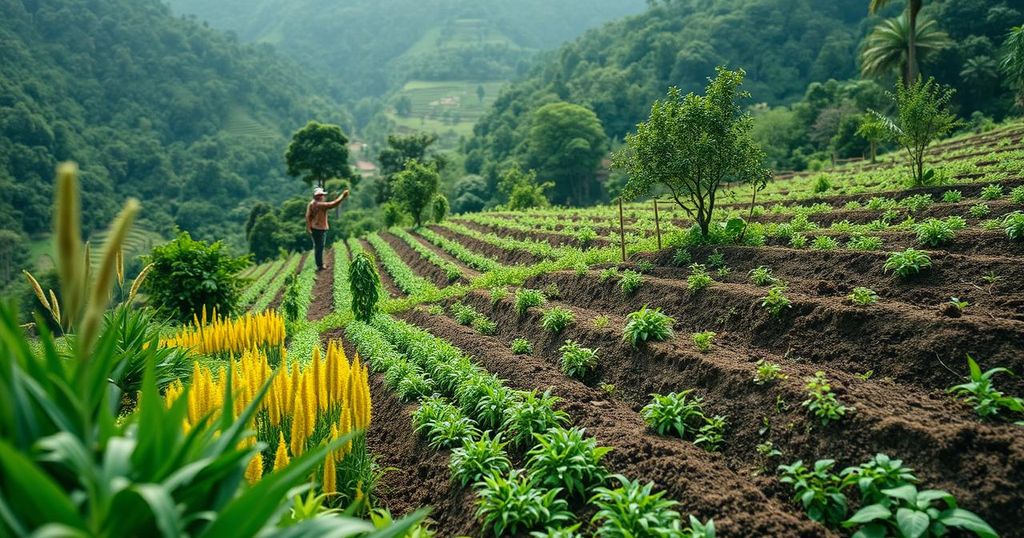A recent expert panel has urged an innovation-driven green transition in the agri-food sector to combat climate change and reduce carbon emissions. While some areas experience early benefits from warming, widespread agricultural disruptions are reported globally. The need for technological advancements and sustainable practices is emphasized to ensure food security while maintaining environmental integrity.
A global collective of agricultural experts has advocated for an innovation-driven transition towards a greener agri-food system, emphasizing this approach as crucial for addressing carbon emissions and mitigating the adverse effects of climate change on food production. While certain food-producing regions have seen initial benefits due to warmer temperatures, significant uncertainties related to global warming are causing considerable disruptions in agricultural practices across Asia, Africa, and South America. These comments were made during the recent 2024 World Agri-Food Innovation Conference, held in Beijing, organized by China Agricultural University. Sun Qixin, President of China Agricultural University and member of the Chinese Academy of Engineering, highlighted that projections indicate a potential 6 to 8 percent decline in food production for every 1°C rise in global temperatures, unless supportive technological advancements are introduced. “However, the impact of a warmer climate is not uniform across the globe,” stated Sun. He noted that while some regions might benefit from milder conditions, extreme shifts in weather patterns are disrupting food production worldwide. He stressed the necessity for a significant reduction in agricultural inputs, such as fertilizers, along with a commitment to research and technological innovation to ensure that these changes do not compromise food output. “We must proceed in this direction despite the challenges,” he added. An assessment by the Intergovernmental Panel on Climate Change indicates that the agri-food sector, from cultivation to consumption, is responsible for approximately one-third of global greenhouse gas emissions. Fu Wenge, a professor at China Agricultural University, suggested that the green transition could be fostered through manageable innovations, which may not always necessitate groundbreaking scientific breakthroughs. He mentioned the Science and Technology Backyard project, which involves collaboration between students and local farmers to promote high-yield crops and environmentally-friendly agricultural practices, a model that has seen implementation in regions like Africa. Ismahane Elouafi, Executive Managing Director of the Consultative Group on International Agricultural Research (CGIAR), emphasized the need for innovation across technological, policy, and institutional dimensions, and urged countries to cooperate in these efforts. “The impact of climate change is multiplying every day, and the only way forward for us is to adopt innovation in its broad sense to really transform the agriculture system,” she remarked. The panelists also emphasized the importance of increasing food production while minimizing the carbon footprint and protecting the environment. Patrick Caron, Vice-Chair of the CGIAR system board, noted, “However, at the moment, we are looking at the increase of production with a different angle,” focusing on the necessity of addressing climate change and the degradation of natural resources. China was cited as a beacon of hope amid growing food insecurity globally, with plans to expand its annual food production capacity to approximately 700 million metric tons by 2030. Elouafi acknowledged China’s role in enhancing productivity and simultaneously alleviating poverty and hunger, attributing much of this success to the country’s embrace of technological advancements in the agri-food sector. As World Food Day was observed on October 16, 2023, the Foreign Ministry of China reiterated its commitment to global food security. Spokeswoman Mao Ning stated, “China has provided more funding and experts and undertaken more projects than any other developing country under the framework of the Food and Agriculture Organization’s South-South Cooperation Programme.” She affirmed China’s dedication to continuing collaboration towards a hunger-free world.
The increasing impacts of climate change on food production present growing challenges to global agriculture. Experts express that a concerted shift towards sustainable practices and technological innovation is essential to address these challenges, particularly against the backdrop of significant greenhouse gas emissions attributable to the agri-food sector. This article discusses insights from a recent conference focused on agri-food innovation which highlights the necessity of reforms within the sector while maintaining food supply.
In summary, the call for a green transition within the agri-food sector underscores the importance of technological innovation and cooperative approaches to mitigate the impacts of climate change. As agricultural output faces decreasing forecasts due to rising temperatures, the integration of sustainable practices and an emphasis on reducing emissions will be crucial. China’s strategies in enhancing food production and reducing poverty serve as exemplary models for global efforts in food security, particularly as nations strive for sustainability in agricultural practices.
Original Source: global.chinadaily.com.cn







